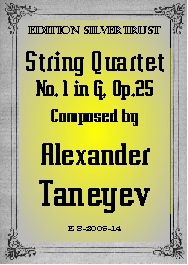Presents
Alexander Taneyev
String Quartet No.1 in G Major, Op.25
 The name Taneyev (spelled, at least in English,
many different ways—Taneiev, Tanaiev, Taneieff, Taneyeff, etc.—due to the
difficulty of transliterating the Cyrillic alphabet) is not, outside of Russia,
that well-known. Those who have heard of it invariably associate it with Sergei
Taneyev (1856-1915), sometimes known as the “Russian Brahms” not because of any
tonal resemblance but because of the complexity and intricateness of his
compositions. Alexander Taneyev (1850-1918) was a distant cousin and not, as is
sometimes claimed, the uncle of Sergei. He inherited an enthusiasm for music
from his parents, but as a member of the Russian upper class, was dissuaded from
pursuing a career as a professional musician. After studying at university, he
entered the Russian civil service, eventually succeeding his father as Director
of the Imperial Chancellery. However, Taneyev also pursued musical studies both
in Germany and later in Petersburg where he became a student of Rimsky Korsakov.
Taneyev's situation was in some ways rather like that of Alexander Borodin, a
Professor of Chemistry. Both were fine composers whose main occupation was not
that of musician. However, whereas Borodin might easily slip away from his test
tubes in the laboratory to a nearby room to note down some theme which suddenly
occurred to him, Taneyev, as a bureaucrat, was unable to just get up and leave
his desk. It was rumored, nonetheless, that he kept a score that he was working
on hidden beneath official documents so that he might pen a few notes between
appointments. Judging from his output——two operas, three symphonies, several
pieces for orchestra, numerous choral works, and a considerable amount of
chamber music——his appointment schedule could not have been too heavy.
The name Taneyev (spelled, at least in English,
many different ways—Taneiev, Tanaiev, Taneieff, Taneyeff, etc.—due to the
difficulty of transliterating the Cyrillic alphabet) is not, outside of Russia,
that well-known. Those who have heard of it invariably associate it with Sergei
Taneyev (1856-1915), sometimes known as the “Russian Brahms” not because of any
tonal resemblance but because of the complexity and intricateness of his
compositions. Alexander Taneyev (1850-1918) was a distant cousin and not, as is
sometimes claimed, the uncle of Sergei. He inherited an enthusiasm for music
from his parents, but as a member of the Russian upper class, was dissuaded from
pursuing a career as a professional musician. After studying at university, he
entered the Russian civil service, eventually succeeding his father as Director
of the Imperial Chancellery. However, Taneyev also pursued musical studies both
in Germany and later in Petersburg where he became a student of Rimsky Korsakov.
Taneyev's situation was in some ways rather like that of Alexander Borodin, a
Professor of Chemistry. Both were fine composers whose main occupation was not
that of musician. However, whereas Borodin might easily slip away from his test
tubes in the laboratory to a nearby room to note down some theme which suddenly
occurred to him, Taneyev, as a bureaucrat, was unable to just get up and leave
his desk. It was rumored, nonetheless, that he kept a score that he was working
on hidden beneath official documents so that he might pen a few notes between
appointments. Judging from his output——two operas, three symphonies, several
pieces for orchestra, numerous choral works, and a considerable amount of
chamber music——his appointment schedule could not have been too heavy.
Taneyev wrote 3 String Quartets. It is thought that they were composed between 1898-1900. The first movement, Maestoso-Allegro, to String Qt. No.1 in G, Op.25 begins with a short majestic introduction reminiscent of Russian Orthodox Church Music. This quickly gives way to what might be called lively traveling music--one can imagine a sleigh racing across the expanses of the Russian countryside (our soundbite). The influence of Rimsky Korsakov—for those who are familiar with Borodin, Glazunov and some of Rimsky’s other students—is quite evident. This very well put together movement is followed up by a short, but superb scherzo marked Presto. There is no trio but the energetic main theme is punctuated by two episodes of a slower more lyrical melody. Next is a very lyrical Andante sostenuto with some interesting chromaticism. The vigorous finale, Allegro risoluto, is clearly based on a Russian folk melody. Long out of print, both professionals and amateurs will find this attractive, romantic Russian work well-worth investigating.
Parts: $24.95